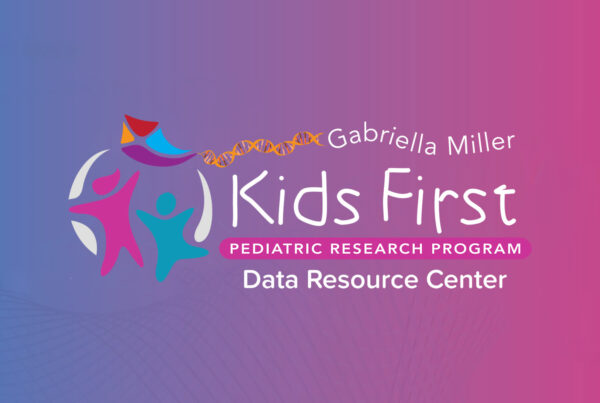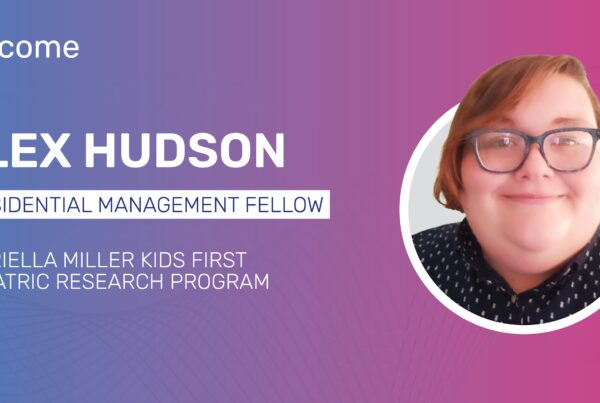The NIH Common Fund-supported Gabriella Miller Kids First Data Resource Center (Kids First DRC) has grown and evolved tremendously since its launch nearly three years ago. What began as a collection of 7 studies encompassing data from a little over 5,000 research participants has since grown to a collection of 23 datasets derived from over 16,000 participants. This dynamic resource is available to scientific investigators across the U.S. and around the world.
As we continue to grow this resource; refining analysis capabilities, resources, available data, and research tools; the Kids First DRC team is eager to foster more collaboration and accelerated discovery on behalf of children with cancer and structural birth defects.
New Resources Added to the Kids First portal
This year, additional resources were added to the Kids First dataset originated by X01 principle investigator Dr. Hakon Hakonarson of the Children’s Hospital of Philadelphia. The data related to his team’s study, Genetics at the Intersection of Childhood Cancer and Birth Defects, is now one of the largest datasets on the Kids First portal, encompassing nearly 37 TB of data derived from 1,776 study participants. Data include aligned reads, individual variants, and joint-called variants. Combining research into both childhood cancers and structural birth defects, this study includes data related to more than 1,200 individual disease diagnoses.
The Kids First Data Resource Portal now contains nearly 1.3 PB of data from over 16,000 study participants. New datasets are slated for release soon, including those from the Kids First study on Esophageal Atresia and Tracheoesophageal Fistulas and Associated Congenital Anomalies, led by Dr. Wendy Chung of Columbia University Health Sciences.
Investigators utilizing the data indexed within the Kids First portal will find new features and analysis tools to assist their research efforts. Using the new Studies browser, investigators can more easily access dbGaP pages connected to Kids First cancer or structural birth defect studies to apply for access. Users can also search across all 23 currently-available datasets to select data types, experimental strategies, family data, disease domain, and research programs, which are then automatically loaded into our Explore Data tool for further analysis.
The Kids First portal’s Variant Database allows users to quickly search for specific gene variants. This allows them to identify participants from across all Kids First datasets with the same mutation, apply for dbGaP access, and more easily conduct cross-disease research.
Support for Kids First Portal Users
The Kids First DRC’s monthly Open Office Hours are ongoing, occurring on the second Tuesday of every month, from 3:00 to 4:00pm/ET. At our Office Hours sessions, attendees have the opportunity to interface with members of the Kids First DRC’s data operations and bioinformatics teams, and to pose questions related to their Kids First projects within the Data Resource Portal, CAVATICA, and PedcBioPortal. All Kids First portal users are invited to attend, from beginners to those who are more advanced.
Recent sessions have focused on the Kids First clinical data; using phenotypes to build better queries in the Explore Data tool for analysis. Those interested in joining these monthly sessions can contact the Kids First DRC’s Scientific Community Program Manager, Dr. David Higgins at higginsd@chop.edu with advanced questions or suggested discussion topics.
Those unable to join in for our live Office Hours sessions can seek assistance anytime within our new User Support Forum. There, users can pose questions, browse discussion topics, and provide insights to fellow researchers on a variety of topics, including data access and analysis, new portal features including the Variant Database and Explore Data tool, recent bug fixes, and more.
Inviting New Collaborations
The Kids First DRC is continuously working to forge new collaborations and assist investigators around the world and across the childhood cancer and structural birth defect research landscape in maximizing the discovery potential of their scientific efforts. Whether partnering with other research efforts or working with researchers to optimize the user experience, Kids First DRC experts and administrators are committed to supporting efforts to develop better treatments and scientific insights for the benefit of children everywhere.
To get involved in these efforts, contact the Kids First DRC team at support@kidsfirstdrc.org. You can also visit our Quick-Start guide to creating your free Data Resource Portal account today!










